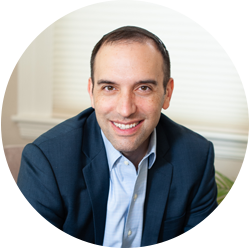Dear Friends,
Last Shabbat’s horrific events in Colleyville, Texas, reverberated all week as Jewish communities around the country, including ours, gathered to decry this act of Jew-hatred and double down on our commitments to safety and security. It was a difficult week of reckoning with the challenges we face, affirming the investments we have already made in communal security, and acknowledging that we have critical work ahead.
For all these reasons, I welcomed the uplifting opportunity to attend Monday morning’s virtual Martin Luther King, Jr. Memorial Breakfast together with colleagues from the Jewish community and beyond. One colleague wrote me an email describing how meaningful it was for her to see and feel our Jewish community’s presence at the event: “It is so important to remember, especially after this past Shabbat, that we draw strength from building partnerships in the wider community.”
One of the invocations at the MLK Breakfast included a prayer based on a concept that Dr. King popularized: “Holy One,” the reverend prayed, “help us to truly become the beloved community.” According to Dr. Bernice A. King and The King Center’s website, the Beloved Community is “not a utopia, but is realistic and achievable, a society of justice and love.”
A realistic and achievable society of justice and love.
I’ve been reflecting all week on this idea.
It makes me think about this country and our democracy, and I’m reminded of the powerful words from Abraham Lincoln’s First Inaugural Address:
“We are not enemies, but friends. We must not be enemies. Though passion may have strained, it must not break our bonds of affection. The mystic chords of memory, stretching from every battle-field, and patriot grave, to every living heart and hearthstone, all over this broad land, will yet swell the chorus of the Union, when again touched, as surely they will be, by the better angels of our nature.”
In a Beloved Community, passion cannot break our bonds of affection because we have the courage and compassion to love even the people whom we least like. We engage in battles of ideas, and we fight about what is good and right and true; but we remember that behind even viewpoints or ideas that we abhor are human beings who are created in the Divine Image and worthy of love.
It also makes me think of the Torah portion we will read tomorrow when the Israelites stand at Mount Sinai and receive the Torah “k’ish echad b’lev echad – like one person, with one heart.” This is the image the rabbis use to describe the unity of the Jewish People as our “freedom from” slavery becomes a “freedom to” take moral and spiritual responsibility for ourselves and our world.
Rabbi David Hartman (z”l) wrote in his essay, “Auschwitz or Sinai?,” “Because of Sinai, Jewish suffering did not create self-pity but moral sensitivity: ‘And you shall love the stranger because you were strangers in the land of Egypt.’”
Perhaps the Beloved Community is a way to understand the transformational power of Sinai. We stand not only shoulder-to-shoulder but also heart-to-heart, united by a strength of conviction that is rooted in moral sensitivity. We love our neighbors as ourselves and we love the most vulnerable among us precisely because we know the experience of vulnerability ourselves.
As we make our way through our broken world and through difficult weeks like this one, I feel so blessed that this is the kind of community we are striving to build, together.
Rabbi Marc Baker

About the Author
CJP President and CEO Rabbi Marc Baker is an educator, writer, and leadership mentor who is devoting his life to Jewish learning and building Jewish communities.
